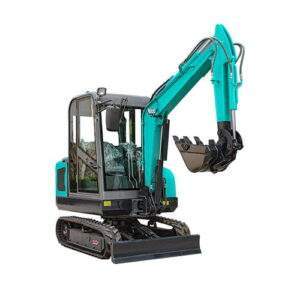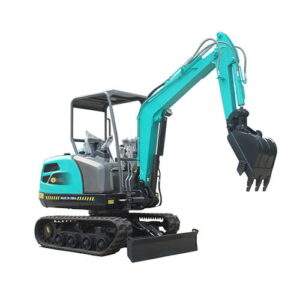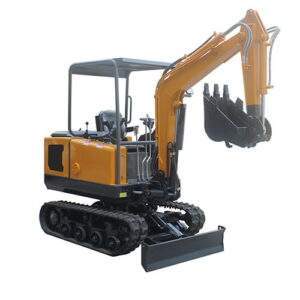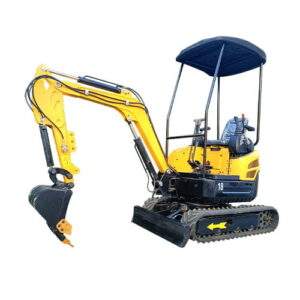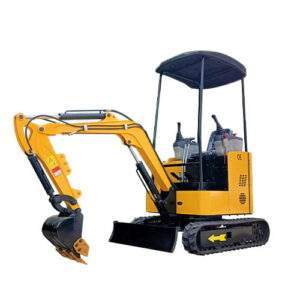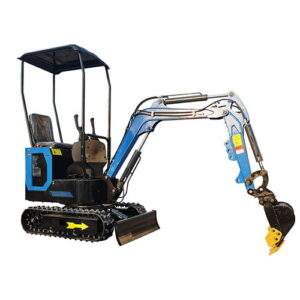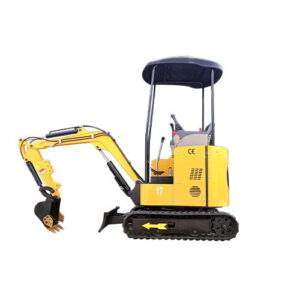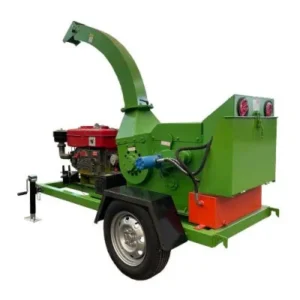Why Mini Compact Excavators Are Ideal for Urban and Tight Space Construction
Introduction
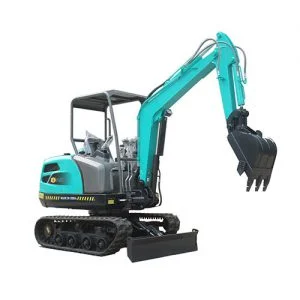
In modern construction, urban and tight space environments present unique challenges. Navigating these areas often requires specialized equipment that can operate efficiently in confined spaces. Mini compact excavators have emerged as an ideal solution for such tasks due to their compact size, maneuverability, and versatility. This blog will explore why mini compact excavators are particularly well-suited for urban and tight space construction, delving into their features, advantages, and various applications.
What is a Mini Compact Excavator?
A mini compact excavator is a smaller version of a traditional excavator, designed to handle tasks in confined or restricted spaces where larger machines cannot operate effectively. These machines are engineered to deliver powerful performance while maintaining a compact footprint, allowing them to work efficiently in urban environments and tight job sites.
Key Specifications
- Operating Weight: Typically between 1 to 8 tons.
- Digging Depth: Ranges from 2.5 to 5 meters (8.2 to 16.4 feet).
- Digging Reach: Usually around 4 to 6 meters (13.1 to 19.7 feet).
- Engine Power: Varies from 15 to 70 horsepower.
- Dimensions: Width of 1.5 to 2.5 meters (4.9 to 8.2 feet) and height of approximately 2.5 to 3 meters (8.2 to 9.8 feet).
These specifications make mini compact excavators versatile and capable of performing a variety of tasks in restricted environments.
Advantages of Mini Compact Excavators
Maneuverability and Flexibility
One of the standout features of mini excavators is their exceptional maneuverability. Their compact size allows them to navigate narrow pathways, tight corners, and congested urban areas where larger excavators would struggle. This flexibility enables operators to work in spaces that were previously inaccessible or challenging.
Versatility in Applications
Mini compact excavators are equipped with a range of attachments that enhance their versatility. These attachments include buckets, augers, hydraulic breakers, and grapples, enabling the machines to handle diverse tasks such as digging, trenching, demolition, and material handling. This adaptability makes them invaluable for various construction projects.
Reduced Environmental Impact
In urban settings, minimizing disruption to the surrounding environment is crucial. Mini excavators have a lower ground pressure and smaller footprint compared to larger machines, which helps in reducing damage to existing infrastructure such as pavements, roads, and landscaping. Their reduced environmental impact is beneficial for maintaining urban aesthetics and functionality.
Enhanced Safety
Safety is a primary concern in construction, especially in confined spaces where larger machinery might pose risks. Mini excavators are designed with enhanced safety features, such as improved visibility, stability controls, and reduced swing radius. These features help mitigate risks and ensure safer operation in tight environments.
Cost Efficiency
Mini compact excavators offer cost efficiency in several ways. Their smaller size results in lower fuel consumption, reduced maintenance costs, and often lower rental or purchase prices compared to larger excavators. This cost-effectiveness makes them a viable option for projects with budget constraints or those requiring frequent equipment changes.
Applications of Mini Compact Excavators
Urban Construction Projects
Urban construction often involves working in densely populated areas with limited space. Mini compact excavators are ideal for tasks such as utility installations, small-scale excavation, and site preparation. Their ability to operate efficiently in tight spaces makes them indispensable for urban development.
Landscaping
In landscaping projects, mini compact excavators can be used to dig trenches, move soil, and clear debris in confined garden or park areas. Their precision and maneuverability allow landscapers to achieve detailed and accurate results while working around existing features.
Renovation and Demolition
For renovation and demolition projects, mini compact excavators can effectively dismantle small structures, remove debris, and excavate areas close to existing buildings. Their compact size allows them to operate in tight spots where larger equipment would be impractical.
Infrastructure Maintenance
Maintenance of infrastructure such as roads, sidewalks, and drainage systems often requires working in restricted spaces. Mini compact excavators are well-suited for tasks like repairing road surfaces, digging utility trenches, and maintaining existing infrastructure with minimal disruption.
Residential Projects
In residential construction, mini compact excavators are used for tasks such as foundation digging, grading, and landscaping in backyards or front yards. Their ability to access and work in confined residential spaces makes them valuable for home improvement projects.
Factors to Consider When Selecting a Mini Compact Excavator
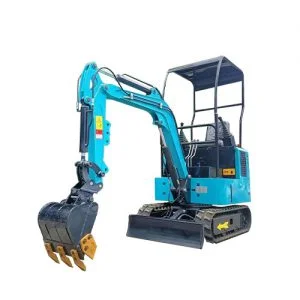
| Factor | Description | Importance |
|---|---|---|
| Operating Environment | Type of terrain and space constraints where the excavator will be used. | Determines the size and features needed. |
| Attachment Compatibility | Types of attachments required for the job, such as buckets, augers, or grapples. | Ensures the excavator can handle various tasks efficiently. |
| Hydraulic Power | The strength of the hydraulic system and its ability to power attachments. | Affects the performance of attachments and overall machine capability. |
| Lift Capacity | Maximum weight the excavator can lift and carry. | Important for tasks involving heavy materials. |
| Digging Depth and Reach | The maximum depth and reach of the excavator’s arm. | Determines suitability for excavation and trenching tasks. |
| Machine Size and Weight | Overall dimensions and weight of the excavator. | Impacts maneuverability and ability to work in confined spaces. |
| Operator Comfort | Features that enhance operator comfort, such as ergonomically designed controls and adjustable seating. | Enhances productivity and reduces operator fatigue. |
| Maintenance Requirements | Frequency and complexity of maintenance tasks. | Affects long-term operating costs and machine reliability. |
| Fuel Efficiency | The efficiency of the machine’s fuel consumption. | Impacts overall operating costs and environmental footprint. |
| Safety Features | Includes features like stability controls, alarms, and visibility enhancements. | Ensures safe operation and reduces risk of accidents. |
Conclusion
Mini compact excavators are an essential tool for urban and tight space construction due to their maneuverability, versatility, and efficiency. Their compact size and range of features allow them to operate effectively in confined environments while minimizing disruption to existing infrastructure. By selecting the right mini compact excavator for a specific project, construction professionals can enhance productivity and achieve optimal results in challenging conditions. Understanding the advantages and applications of mini compact excavators ensures that these machines are used effectively to address the demands of modern construction projects.
FAQ
Q:What are mini compact excavators used for?
A:Mini compact excavators are used for a variety of tasks including utility installation, landscaping, renovation, demolition, and infrastructure maintenance. Their compact size and versatility make them suitable for work in urban and confined spaces.
Q:How do mini compact excavators differ from larger excavators?
A:Mini compact excavators are smaller in size and weight compared to larger excavators. This design allows them to operate efficiently in restricted spaces where larger machines cannot access. They are also more cost-effective and easier to maneuver.
Q:What are the benefits of using a mini compact excavator?
A:The benefits of using a mini compact excavator include improved maneuverability in tight spaces, versatility with various attachments, reduced environmental impact, enhanced safety features, and cost efficiency in terms of fuel and maintenance.
Q:Can mini compact excavators handle heavy-duty tasks?
A:While mini compact excavators are designed for lighter to moderate tasks, some models with higher lifting capacities and advanced features can handle more demanding projects. It is important to select the appropriate model based on the specific requirements of the task.
Q:How do I choose the right mini compact excavator for my project?
A:Selecting the right mini compact excavator involves considering factors such as operating weight, digging depth, engine power, and special features needed for your project. Assess the specific requirements of your construction site and choose a model that offers the best combination of performance and maneuverability.
Q:Are mini compact excavators easy to operate?
A:Mini compact excavators are generally user-friendly and designed for ease of operation. Many models come with intuitive controls and safety features that simplify operation. Proper training and experience can further enhance proficiency in using these machines.

